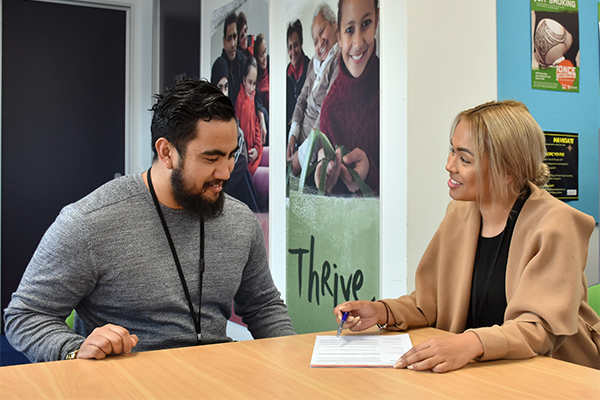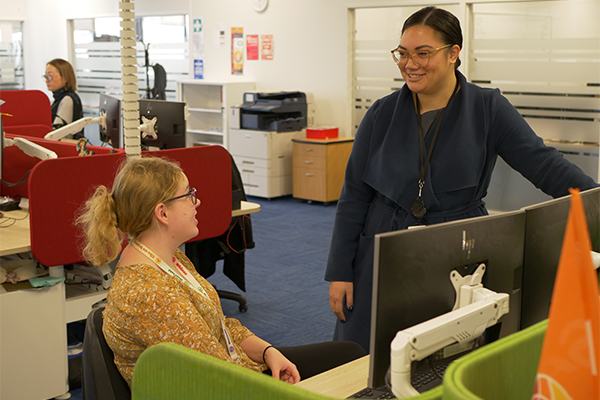Medium-Large Organisation Highly Commended

Mentoring through existing employee-led networks has helped the Ministry of Social Development (MSD) develop its employee’s own cultural capability, so they can build genuine partnerships with Māori, Pacific and the diverse ethnicities and cultures they serve.
MSD is one of New Zealand’s largest government departments, responsible for overseeing the country’s social welfare system.
Kaihautū, Director Learning and Capability Tony Stenhouse says the MSD Mentoring Programme journey began in 2020 with the aim of developing its people by partnering to support existing and emerging employee-led networks. The kaupapa of the MSD Mentoring Programme is “Growth through partnership” and it is available to all employees at the Ministry of Social Development (MSD) Te Manatū Whakahiato Ora.
“The Ministry of Social Development supports over 1.4 million New Zealanders every year. To deliver a positive client experience every time to our increasingly diverse communities, we need a diverse and thriving workforce,” says Tony.
“An inclusive workplace isn’t just one where employees from diverse backgrounds take part, but is a workplace where people are contributing as their whole selves, including their beliefs, culture and the unique aspects that make them individuals. Mentoring through employee-led networks helps unlock this.”
Leo Tanoa, a Pacific staff network in Auckland, was one of the first networks the ministry partnered with.
“Our Pacific people in Auckland wanted a collective so they could support each other to grow in confidence, competence, and have a sense of belonging. Partnering with MSD’s Mentoring Programme gave this idea traction,” says Tony.
The other inaugural partner was the MSD Women’s Network. The programme has expanded to include other networks, such as a Māori staff network in the South Island, the Pan-Asian Staff Network, the Disabled Network and the Early Professional’s Network. Regions and workstreams have also come on board as partners making the programme available across Aotearoa New Zealand.
Groups take the core programme, overlay their cultural and other considerations, and drive the programme to meet their diverse needs. Mentees and mentors are invited to participate within their employee-led networks.
Mentees choose their preferred mentor, someone who can support them in their life and career, growing their confidence and ability to navigate difficult situations. In turn, mentors grow their coaching and leadership skills and refresh their view through the eyes of the mentee.
Communities of Practice every three months allow participants to connect with mentees or mentors from other networks throughout the country. This has grown relationships right across the business and given mentees and mentors more insight into new areas.
“As members build relationships with diverse peers, they develop trusting relationships and the confidence to ask questions that help them better understand and work with their colleagues,” says Tony.
Participants say the programme has given them confidence, helping them identify and act on their career goals.
“Before taking part, I was feeling directionless and unmotivated. I knew I wasn’t where I wanted to be career-wise but wasn’t sure about what to do about it. I remember reading a post from Nadine [a senior MSD executive] about why mentoring matters and it was a wake-up call. I applied for the programme and was paired with the amazing Mel as my mentor. I worked with Mel to set goals for what I wanted to achieve and steps on how I was going to achieve those goals. After each mentoring session, I walked away with more confidence in myself and my abilities,” reports one of the first mentees.

“One of the most important things I learnt from Mel was the strength in my Samoan identity. I didn’t need to downplay it to get to where I wanted to be but instead to embrace and share what it means to be Samoan.”
The Ministry’s leadership team has celebrated the programme in all-employee leadership messages and encouraged employees to take up mentoring opportunities.
Tony says mentoring relationships are kept separate from management relationships and direct reporting channels. This gives mentees access to another leader, who often has a deep understanding of the challenges they might face as a member of a non-dominant group.
“There are always challenges to inclusion when employees from very different backgrounds come together. We find that when solutions come from within the community itself, they are stronger and more sustainable. The MSD Mentoring Programme strengthens our staff communities to find and bring their own answers.”






